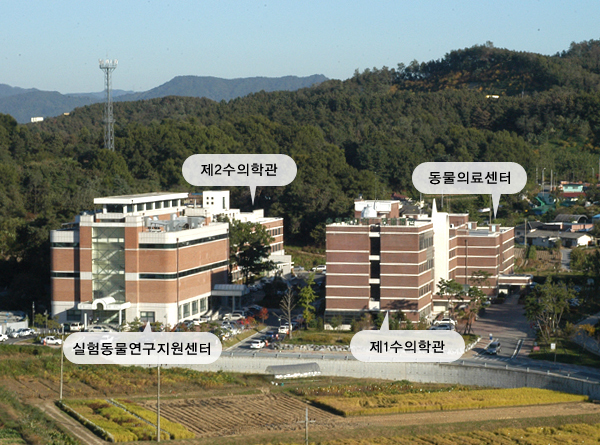Difference between revisions of "Korea - Chungbuk National University College of Veterinary Medicine"
m (Created page with "==Images== File:ChungbukNU 01.jpg<BR> <br>File:ChungbukNU_02.jpg ==Introduction== <!----Write below this line---> <BR> To advance animal and human health through ...") |
|||
| Line 5: | Line 5: | ||
==Introduction== <!----Write below this line---> | ==Introduction== <!----Write below this line---> | ||
| + | To advance animal and human health through education, research, and public service, Veterinary education at [https://vetmed.cbnu.ac.kr/ Chungbuk National University] was organized as the Department of Veterinary Medicine, College of Agriculture in March, 1989. The department was re-established as the College of Veterinary Medicine in 1993. Six-year education system of under-graduate course which was very innovative in Korean veterinary education was introduced in 1998. Now, we have Veterinary Medical Center where produce well-trained veterinarians and service advanced diagnosis and treatment. Laboratory Animal Research Center and Research Institute of Veterinary Medicine were opened for supply of laboratory animals and biomedical research. <BR><BR> | ||
| + | |||
| + | ==History== <!----Write below this line---> | ||
| + | *'''1989''' Established as Major in Veterinary Medicine, College of Agricultural Science | ||
| + | *'''1992''' Established Master Degree course, Graduate school | ||
| + | *'''1993''' Established College of Veterinary Medicine | ||
| + | *'''1995''' Established Ph.D course, Graduate school | ||
| + | *'''1997''' Established Major in Pre-Veterinary Medicine, College of Natural Science | ||
| + | *'''2000''' Established Veterinary Hospital | ||
| + | *'''2004''' Second building of College of Veterinary Medicine is completed | ||
| + | *'''2006''' Opening of Laboratory Animal Research Center | ||
| + | *'''2009''' Pre-Veterinary Medicine Major is transfered to College of Veterinary Medicine (prior College of Natural Science) | ||
| − | |||
| − | |||
| − | |||
| − | |||
| − | |||
| − | |||
| − | |||
| − | |||
| − | |||
| − | |||
| − | |||
| − | |||
| − | |||
| − | |||
| − | |||
| − | |||
| − | |||
| − | |||
| − | |||
| − | |||
| − | |||
| − | |||
==Education== <!----Write below this line---> | ==Education== <!----Write below this line---> | ||
| − | + | A veterinary college student in Korea must complete the two-year(80 credits) pre-vet course and the four-year(160 credits) undergraduate courses of veterinary medicine. As an undergraduate student, he/she needs to complete the following subjects step-by-step: | |
| − | + | *'''Basic veterinary medicine''' - | |
| − | + | **veterinary anatomy(comparative and neuroanatomy), | |
| − | + | **veterinary histology, | |
| − | + | **veterinary embryology, | |
| − | + | **veterinary biotechnology, | |
| − | + | **veterinary physiology, | |
| − | + | **veterinary immunology, | |
| − | + | **veterinary biochemistry, | |
| − | + | *'''Preventive veterinary medicine''' - | |
| − | < | + | **veterinary pathology, |
| − | + | **veterinary pharmacology, | |
| − | + | **veterinary toxicology, | |
| + | **public health science(food and environmental hygiene), | ||
| + | **veterinary microbiology(bacteriology, virology), | ||
| + | **laboratory animal medicine, | ||
| + | **veterinary infectious diseases, | ||
| + | **veterinary parasitology, etc. | ||
| + | *'''Clinical veterinary medicine''' - | ||
| + | **veterinary internal medicine, | ||
| + | **veterinary surgery, | ||
| + | **veterinary obstetrics, | ||
| + | **veterinary clinical pathology, | ||
| + | **veterinary diagnostic Imaging, | ||
| + | **diseases of fowls, | ||
| + | **aquatic animal diseases, | ||
| + | **zoo and wildlife animal disease, | ||
| + | **veterinary jurisprudence, etc. | ||
| + | <br> | ||
| + | After completing the whole courses of study, you will be qualified to take the national veterinary board hosted by the Ministry of Agriculture and Forestry. Once you achieve the veterinary license, you will become a professional veterinarian in Korea. | ||
==Research== <!----Write below this line---> | ==Research== <!----Write below this line---> | ||
| Line 64: | Line 71: | ||
==Number of Undergraduates== <!----Write below this line---> | ==Number of Undergraduates== <!----Write below this line---> | ||
| − | + | 240 | |
==Number of Postgraduates== <!----Write below this line---> | ==Number of Postgraduates== <!----Write below this line---> | ||
Revision as of 12:49, 25 September 2011
Images
Introduction
To advance animal and human health through education, research, and public service, Veterinary education at Chungbuk National University was organized as the Department of Veterinary Medicine, College of Agriculture in March, 1989. The department was re-established as the College of Veterinary Medicine in 1993. Six-year education system of under-graduate course which was very innovative in Korean veterinary education was introduced in 1998. Now, we have Veterinary Medical Center where produce well-trained veterinarians and service advanced diagnosis and treatment. Laboratory Animal Research Center and Research Institute of Veterinary Medicine were opened for supply of laboratory animals and biomedical research.
History
- 1989 Established as Major in Veterinary Medicine, College of Agricultural Science
- 1992 Established Master Degree course, Graduate school
- 1993 Established College of Veterinary Medicine
- 1995 Established Ph.D course, Graduate school
- 1997 Established Major in Pre-Veterinary Medicine, College of Natural Science
- 2000 Established Veterinary Hospital
- 2004 Second building of College of Veterinary Medicine is completed
- 2006 Opening of Laboratory Animal Research Center
- 2009 Pre-Veterinary Medicine Major is transfered to College of Veterinary Medicine (prior College of Natural Science)
Education
A veterinary college student in Korea must complete the two-year(80 credits) pre-vet course and the four-year(160 credits) undergraduate courses of veterinary medicine. As an undergraduate student, he/she needs to complete the following subjects step-by-step:
- Basic veterinary medicine -
- veterinary anatomy(comparative and neuroanatomy),
- veterinary histology,
- veterinary embryology,
- veterinary biotechnology,
- veterinary physiology,
- veterinary immunology,
- veterinary biochemistry,
- Preventive veterinary medicine -
- veterinary pathology,
- veterinary pharmacology,
- veterinary toxicology,
- public health science(food and environmental hygiene),
- veterinary microbiology(bacteriology, virology),
- laboratory animal medicine,
- veterinary infectious diseases,
- veterinary parasitology, etc.
- Clinical veterinary medicine -
- veterinary internal medicine,
- veterinary surgery,
- veterinary obstetrics,
- veterinary clinical pathology,
- veterinary diagnostic Imaging,
- diseases of fowls,
- aquatic animal diseases,
- zoo and wildlife animal disease,
- veterinary jurisprudence, etc.
After completing the whole courses of study, you will be qualified to take the national veterinary board hosted by the Ministry of Agriculture and Forestry. Once you achieve the veterinary license, you will become a professional veterinarian in Korea.
Research
Clinical
School name
College of Veterinary Medicine Chungbuk National University
Established
Location
Principal's name
Total number of Students
about 40 in each class, 240 in total
Number of Undergraduates
240
Number of Postgraduates
Website address
Contact details
410 SungBong-Ro Heungdeok-gu, Cheongju-si Chungbuk (361-763 Korea)
Tel:+82-43-261-2595


